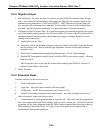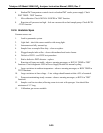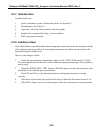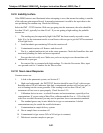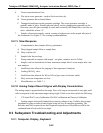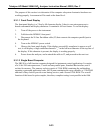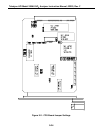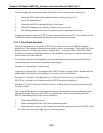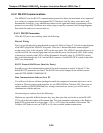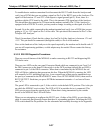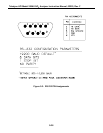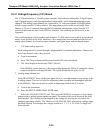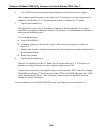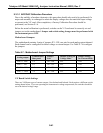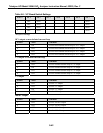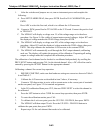
Teledyne API Model 200AU NO
X
Analyzer Instruction Manual, 02293, Rev. F
9-36
9.3.2 RS-232 Communications
The M200AU uses the RS-232 communications protocol to allow the instrument to be connected
to a variety of computer based equipment. RS-232 has been used for many years and is well
documented. Generally, every manufacturer observes the signal and timing requirements of the
protocol very carefully. Problems arise when trying to specify connectors, and wiring diagrams
that attach the analyzer to various devices.
9.3.2.1 RS-232 Connection
If the RS-232 port is not working, check the following:
Physical Wiring
First is to get the physical wiring hooked up correctly. Refer to Figure 9-3 for the wiring diagram
of the DB-9 plug on the M200AU rear panel. There are 2 features that make connecting the
wiring easier. First is the red/green LED’s on the rear panel. The M200AU provides the power to
run the red LED, the external equipment will provide the power for the green LED. If the wiring
is hooked up correctly both LED’s will be illuminated. Secondly, there is a DTE-DCE switch,
this switch interchanges pin 2 & 3 on the DB-9 connector. Set the DTE-DCE switch so that both
LED’s are illuminated.
RS-232 Protocol (BAUD rate, Data bits, Parity)
Second is to get the communication protocol for each instrument to match. In Figure 9-3 the
default RS-232 parameters are listed. The BAUD rate can be changed in the software menus
under SETUP-MORE-COMM-BAUD.
Data Communications Software for a PC.
You will need to have a software package to enable the computer to transmit and receive on its
serial port. There are many such programs, we use PROCOMM at Teledyne API. Once you set
up the variables in PROCOMM and your wiring connections are correct, you will be able to
communicate with the analyzer.
If connecting to a modem, check the following:
Modems are especially difficult because they may have pins that need to be at certain EIA RS-
232 levels before the modem will transmit data. The most common requirement is the Ready to
Send (RTS) signal must be at logic high (+5V to +15V) before the modem will transmit. The
Teledyne API analyzer sets pin 8 (RTS) to 10 volts to enable modem transmission.



